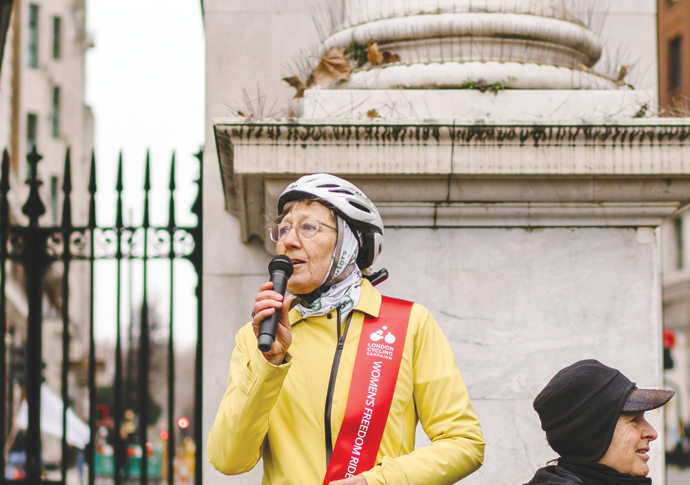Liberate female cyclists – make our roads safe to use
Women make up just 30 per cent of cycle trips
Friday, 10th March 2023 — By Elidh Murray

Eilidh Murray addressing the crowd at Marble Arch on Sunday
“LET me tell you what I think of bicycling. I think it has done more to emancipate women than anything else in the world. I stand and rejoice every time I see a woman ride by on a wheel,” said American social reformer and women’s rights activist Susan B Anthony in 1896.
How far have we come in the past 130 years? Nowhere near far enough.
Although women make up 51 per cent of the population, they only make up 30 per cent of cycle trips. And this has to change.
If you were in central London on Sunday, you might have noticed a very large group of cyclists, mainly women, riding round some of our iconic sights such as Marble Arch.
The ride was to celebrate International Women’s Day and to ask London’s mayor to ensure cycling is an inclusive transport mode that women and men use equally, across London, by 2030.
To achieve this, we have three simple asks of Sadiq Khan and by implication, local borough leaders:
One: Address physical safety for women when cycling
Two: Address social safety for women when cycling
Three: Think beyond the cycle commute and create safe local networks for cycling
We want segregated cycle lanes and properly signposted routes which don’t go through poorly lit industrial estates or alongside canals.
Women often are bullied and close passed by motor vehicles on roads and we want them to feel able to report such incidents knowing they will be taken seriously by the police.
Secure bike storage is often a barrier; it’s difficult to heave a bike up flights of stairs while looking after small children and carrying shopping.
And women need safe local routes to cycle with their children to school, do shopping, accompany children to after-school activities as well as routes to enable them to cycle to work safely.
On average, women have less free time, less disposable income, less access to motor vehicles and more caring responsibilities than men. Bikes have played a significant role in liberating women in the past.
And cycling could be liberating for women in London today, offering us independence, health, and affordable, sustainable transport. But it can only do that in the right environment.
• Eilidh Murray is from the Islington Cycling Campaign